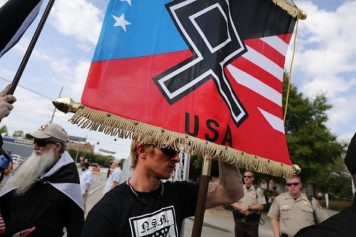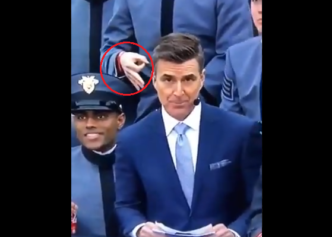
People making hear, see, speak no evil gesture
The brainchild of a Black woman named Tarana Burke a decade ago to help underprivileged women of color impacted by sexual abuse, the #MeToo movement has caught fire just recently in the national discussion on gender-based discrimination, harassment and assault. The success of #MeToo raises a question as to whether America needs a reckoning on racism, and whether Black people and other victims of racism need a #MeToo movement for racism and white supremacy.
The recent comments by President Trump–who said he wants more immigrants from countries such as Norway rather than “shithole” countries such as Haiti, El Salvador and the nations of the African continent, then insisted he is not a racist—have ignited a conversation on racism. The recent grilling of Department of Homeland Security Secretary Kirstjen Nielsen by Sens. Kamala Harris and Cory Booker on Trump’s comments suggest the discussion has been raised to a new level. Booker attacked Nielsen for her “amnesia” regarding Trump’s racist comments, and mentioned the words of Martin Luther King and the “greatest heroes in this country who spoke out about people who have convenient amnesia or who are bystanders.” “When ignorance and bigotry is allied with power it is a dangerous force in our country. Your silence and your amnesia is complicity,” Booker said.
Harris accused Nielsen of racism, calling her out for claiming she was unaware Norway is a predominantly white nation, for insinuating Norwegians are hardworking but Haitians and Africans are not, and for failing to mention domestic terrorist attacks by white supremacists, who are responsible for more violence than any other extremist movement in the U.S.
As if to respond to Secretary Nielsen, Stacey Patton wrote in Dame that white people know exactly how racism works, that the “defiant ignorance” coming from the white right and left perpetuates white supremacy and privilege. The secret, she said, is for Black people to stop educating white people about racism and showing them how to be better, in the naive belief that cleaning up after them will clear up any misunderstandings and result in systemic change. White people are not ignorant about racism, she believes, as racist propaganda centers around the intellectual superiority of whites. “The day that Black folks stop making excuses for White people’s racism will be the first step toward emotional emancipation and the tyranny needed to destroy this system,” she said. Patton does not suggest that Black folks stop fighting racism or speak the truth, but rather change our focus on stop centering on white people and respectability politics. White people, she believes, must work in their own communities, seek the knowledge from those who have written about white privilege and white supremacy, join anti-racist organizations and fight for racial justice.
Social science definitions of racism go beyond mere prejudice to include the role of race and power, of a system of hierarchy that upholds some groups and oppresses others. In 2010 Keeanga-Yamahtta Taylor wrote in Socialist Worker that the national discussion on race has shifted so far to the right that the definition of racism has been reduced to name calling or any mention of race. This came as the race-baiting and scapegoating Tea Party became a legitimate force in U.S. politics, she noted. In the absence of a strong anti-racism movement, there was little resistance to this redefinition of racism in media and politics, she argued. Since that time, the white nationalist alt-right has mainstreamed itself, using pseudo-social-scientific theory to hide its racism. Jamil Smith of the Los Angeles Times told the Slate Daily Podcast that conservatives have succeeded in promoting white supremacy, making it a greater sin to call out racism than to commit actual racist acts and create racist policies. Making his point, he cited the painting of Black Lives Matter activists as terrorists, and the fallout that ESPN journalist Jemele Hill faced for calling Trump a white supremacist.
Smith identified the need to understand the mechanics of race, and argued white people must become more comfortable with recognizing and identifying race. “We are at an urgent moment right now. This is not a game,” Smith said. “You have the ‘birther-in-chief’ in the Oval Office putting his personal bias into policies that are going to affect virtually every American.”
A recent story in Vox suggests that Black Lives Matter made #MeToo more effective and was a starting point to a racial reckoning. The article — actually a conversation with Jane Coaston, Michelle Garcia, P.R. Lockhart, and German Lopez — offers that the deeply entrenched nature of racism means there is widespread denial over the role of implicit bias and microaggressions. “Racists are all too often able to defend themselves by simply claiming that their racism doesn’t count as racism,” said Jane Coaston. “I think that our history puts the ‘what counts as racism’ bar so high that many believe to fit underneath it renders them ‘not racist.’ ‘I’ve never burned a cross! I’ve never called anyone a ni**er! I just think that interracial relationships are bad!’” she added. The cultural forces are not yet aligned for a racial reckoning, the panelists suggest, and society should expect a pushback from whites across partisan lines. Further, the bottom-up approach of the #MeToo movement alone might not provide the right approach for race, as opposed to what South Africa did with its Truth and Reconciliation Commission, or the steps which Germany took to address its role in the Holocaust. “We never did that with slavery, and because of that, we’ve failed to even address the entrenched racism we’re still dealing with today,” said Michelle Garcia.
Julianne Malveaux wonders when there will be a groundswell against racism in the workplace similar to the awareness against sexual harassment. She asks why there is a shortage of Black staffers on Capitol Hill, or why the placing of a noose on a Black employee’s workstation is viewed as a joke and not taken seriously. Such a noose incident took place at the factory of the U.S. Mint in Philadelphia, amid allegations the Treasury Department has done little to address the causes of racial discord at the workplace, and swept matters under the rug. Perhaps racism and racial harassment are a little more complicated than sexism and sexual harassment. “Half of the population, after all, is female, and while women make the slow climb up the hierarchy in corporate America, politics, the media, and entertainment, the pace has been steady enough that powerful women are now able to call men out on their misbehavior, with women demanding resignations of (some) misbehaving men,” Malveaux wrote in the Philadelphia Tribune. “However, too few White women and men have been willing to apply the same ‘zero tolerance’ to employment matters regarding race.”
Kareem Abdul-Jabbar believes that while 2017 was a return to the 1950s and a year of racism, sexism and attacks on dissent, 2018 provides the opportunity to turn things around. Writing for The Hollywood Reporter, Abdul-Jabbar said he is encouraged by the signs of resistance to oppression in the #MeToo movement and the mass protests by athletes, but also notes the backlash. “Sports organizations are trying to muzzle athletes from expressing themselves because they say sports is no place for political commentary. Yet they play the national anthem and have military displays that clearly express political opinion. Only the oppressed, mostly people of color who actually have reason to speak out, are being told to hold their tongues,” he wrote. The legendary athlete and activist noted that silence leads to more oppression, underscoring the need for people to raise their voices for all marginalized groups and those who face injustice.
A public discussion of Trump’s comments about African nations — and attempts by his staff to defend his remarks — has the potential to get to the heart of racism and white supremacy, which involves prejudice, power and control over policy. The #MeToo movement is raising awareness of sexual abuse and harassment, but whether America will have a similar reckoning on racism and white supremacy is an open question.


